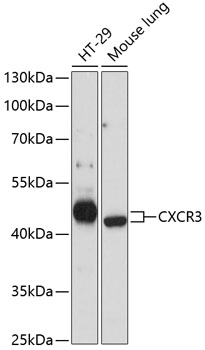Anti-CXCR3 Antibody (CAB11601)
- SKU:
- CAB11601
- Product type:
- Antibody
- Reactivity:
- Human
- Mouse
- Host Species:
- Rabbit
- Isotype:
- IgG
- Antibody Type:
- Polyclonal Antibody
- Research Area:
- Cardiovascular
Description
| Antibody Name: | Anti-CXCR3 Antibody |
| Antibody SKU: | CAB11601 |
| Antibody Size: | 20uL, 50uL, 100uL |
| Application: | WB |
| Reactivity: | Human, Mouse |
| Host Species: | Rabbit |
| Immunogen: | Recombinant fusion protein containing a sequence corresponding to amino acids 289-368 of human CXCR3 (NP_001495.1). |
| Application: | WB |
| Recommended Dilution: | WB 1:500 - 1:2000 |
| Reactivity: | Human, Mouse |
| Positive Samples: | HT-29, Mouse lung |
| Immunogen: | Recombinant fusion protein containing a sequence corresponding to amino acids 289-368 of human CXCR3 (NP_001495.1). |
| Purification Method: | Affinity purification |
| Storage Buffer: | Store at -20°C. Avoid freeze / thaw cycles. Buffer: PBS with 0.02% sodium azide, 50% glycerol, pH7.3. |
| Isotype: | IgG |
| Sequence: | NCGR ESRV DVAK SVTS GLGY MHCC LNPL LYAF VGVK FRER MWML LLRL GCPN QRGL QRQP SSSR RDSS WSET SEAS YSGL |
| Gene ID: | 2833 |
| Uniprot: | P49682 |
| Cellular Location: | Cell membrane, Multi-pass membrane protein |
| Calculated MW: | 28kDa/40kDa/45kDa |
| Observed MW: | 41kDa |
| Synonyms: | CXCR3, CD182, CD183, CKR-L2, CMKAR3, GPR9, IP10-R, Mig-R, MigR |
| Background: | This gene encodes a G protein-coupled receptor with selectivity for three chemokines, termed CXCL9/Mig (monokine induced by interferon-g), CXCL10/IP10 (interferon-g-inducible 10 kDa protein) and CXCL11/I-TAC (interferon-inducible T cell a-chemoattractant). Binding of chemokines to this protein induces cellular responses that are involved in leukocyte traffic, most notably integrin activation, cytoskeletal changes and chemotactic migration. Alternatively spliced transcript variants encoding different isoforms have been found for this gene. One of the isoforms (CXCR3-B) shows high affinity binding to chemokine, CXCL4/PF4 (PMID:12782716). |
| UniProt Protein Function: | CXCR3: Receptor for CXCL9, CXCL10 and CXCL11 and mediates the proliferation of human mesangial cells (HMC). Belongs to the G-protein coupled receptor 1 family. 3 isoforms of the human protein are produced by alternative splicing. |
| UniProt Protein Details: | Protein type:Membrane protein, integral; GPCR, family 1; Receptor, GPCR; Membrane protein, multi-pass Chromosomal Location of Human Ortholog: Xq13 Cellular Component: integral to plasma membrane; cytoplasm; plasma membrane; external side of plasma membrane Molecular Function:C-X-C chemokine binding; chemokine binding; chemokine receptor activity; receptor activity; C-X-C chemokine receptor activity Biological Process: positive regulation of chemotaxis; apoptosis; calcium-mediated signaling; positive regulation of cAMP metabolic process; chemotaxis; G-protein coupled receptor protein signaling pathway; positive regulation of angiogenesis; negative regulation of angiogenesis; elevation of cytosolic calcium ion concentration; cell surface receptor linked signal transduction; negative regulation of endothelial cell proliferation; positive regulation of cell proliferation; regulation of leukocyte migration; positive regulation of transcription from RNA polymerase II promoter; angiogenesis; positive regulation of release of sequestered calcium ion into cytosol; inflammatory response; cell motility; cell adhesion |
| NCBI Summary: | This gene encodes a G protein-coupled receptor with selectivity for three chemokines, termed CXCL9/Mig (monokine induced by interferon-g), CXCL10/IP10 (interferon-g-inducible 10 kDa protein) and CXCL11/I-TAC (interferon-inducible T cell a-chemoattractant). Binding of chemokines to this protein induces cellular responses that are involved in leukocyte traffic, most notably integrin activation, cytoskeletal changes and chemotactic migration. Alternatively spliced transcript variants encoding different isoforms have been found for this gene. One of the isoforms (CXCR3-B) shows high affinity binding to chemokine, CXCL4/PF4 (PMID:12782716). [provided by RefSeq, Jun 2011] |
| UniProt Code: | P49682 |
| NCBI GenInfo Identifier: | 2829400 |
| NCBI Gene ID: | 2833 |
| NCBI Accession: | P49682.2 |
| UniProt Secondary Accession: | P49682,O15185, Q7Z710, Q9P2T4, Q9P2T5, B2R982, |
| UniProt Related Accession: | P49682 |
| Molecular Weight: | Observed MW: 44kDaCalculated MW: 28kDa/40kDa/45kDa |
| NCBI Full Name: | C-X-C chemokine receptor type 3 |
| NCBI Synonym Full Names: | chemokine (C-X-C motif) receptor 3 |
| NCBI Official Symbol: | CXCR3 |
| NCBI Official Synonym Symbols: | GPR9; MigR; CD182; CD183; Mig-R; CKR-L2; CMKAR3; IP10-R |
| NCBI Protein Information: | C-X-C chemokine receptor type 3; CXC-R3; CXCR-3; Mig receptor; IP10 receptor; IP-10 receptor; G protein-coupled receptor 9; chemokine (C-X-C) receptor 3; interferon-inducible protein 10 receptor |
| UniProt Protein Name: | C-X-C chemokine receptor type 3 |
| UniProt Synonym Protein Names: | CKR-L2; G protein-coupled receptor 9; Interferon-inducible protein 10 receptor; IP-10 receptor; CD_antigen: CD183 |
| Protein Family: | C-X-C chemokine receptor |
| UniProt Gene Name: | CXCR3 |
| UniProt Entry Name: | CXCR3_HUMAN |



